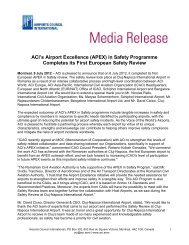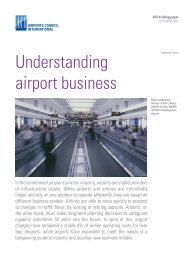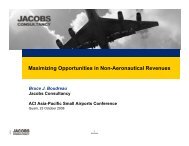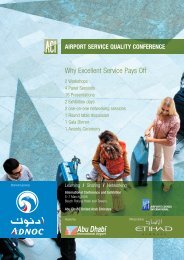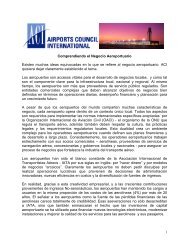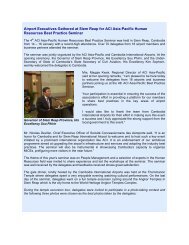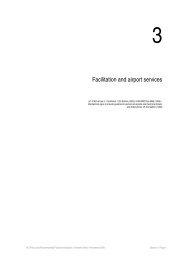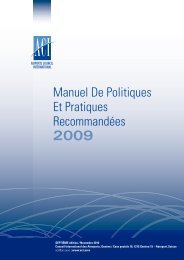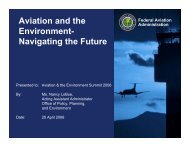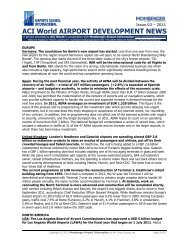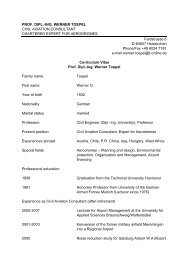CUSTOMER SERVICE - Airports Council International
CUSTOMER SERVICE - Airports Council International
CUSTOMER SERVICE - Airports Council International
You also want an ePaper? Increase the reach of your titles
YUMPU automatically turns print PDFs into web optimized ePapers that Google loves.
ACI information brief<br />
NOVEMBER 2010<br />
<strong>CUSTOMER</strong> <strong>SERVICE</strong><br />
www.aci.aero<br />
Customer service is a core value for airports, not just in respect of<br />
passengers but also in respect of the airlines and airport organizations,<br />
the non-travelling public and airport staff, that make up an airport’s<br />
customer base. Understanding and meeting their disparate needs and<br />
expectations is the key to operating an airport successfully.<br />
The increasingly globalised economy and<br />
rising standards of living have driven demand<br />
for both business and leisure travel. The<br />
emergence of the low cost carriers has made<br />
air travel more accessible and affordable<br />
than ever before. Annually, approximately 5<br />
billion passengers travel on 77 million flights,<br />
at around 1,700 airports globally. These<br />
passenger numbers are expected to double<br />
by 2025 but without a corresponding increase<br />
in the number of airports.<br />
So, airports have to handle increasing<br />
numbers of passengers, who also have rising<br />
expectations about the services and standard<br />
of service that an airport should provide.<br />
Then there are also the mandatory customs,<br />
immigration, quarantine and aviation security<br />
requirements and processes, which have<br />
become more complex and onerous. Some<br />
countries also enforce strict bio-security<br />
measures, which complicate the passenger<br />
facilitation processes further. So, managing<br />
the passenger facilitation process and service<br />
quality at airports is a challenge.<br />
On the regulatory side, ACI works closely with<br />
the <strong>International</strong> Civil Aviation Organization<br />
(ICAO) to address facilitation issues. In recent<br />
years, the SARS and Avian Flu outbreaks<br />
and the Influenza A(H1N1) pandemic, has<br />
highlighted the important role that airlines and<br />
airports can play in preventing the spread of<br />
infectious disease. On the security side, the<br />
restriction on the carriage of Liquids, Aerosols<br />
and Gels (LAGs) has had a significant impact<br />
on passengers and airport processes, since it<br />
was introduced in late 2006. These measures<br />
will need to remain in place until such time that<br />
Liquid Explosive Detection Systems (LEDs)<br />
are deployed at airports, which is unlikely<br />
before 2013. The threat from terrorists using<br />
improvised explosive devices that are artfully<br />
concealed on their body, has also seen a move<br />
towards the use of body scanners at airports.<br />
This presents a number of challenges, as<br />
these devices are heavy and have a larger<br />
footprint than the conventional systems in<br />
use at airports. Passenger concerns about<br />
safety and privacy with these devices have<br />
arisen. ACI believes that these concerns have<br />
been adequately addressed in the design and<br />
operational protocols and government studies<br />
show that these devices are completely safe.<br />
Therefore, ACI advocates that airports should<br />
be allowed (but not be required) to use these<br />
devices in passenger screening.<br />
ACI is also working with the <strong>International</strong><br />
Air Transport Association (IATA) and other<br />
stakeholders on cross-industry initiatives<br />
to improve the facilitation of passengers.<br />
There are various industry working groups<br />
that are developing recommended practices<br />
for technology solutions and processes,<br />
facilitating the early adoption of innovative<br />
solutions. In this regard, the move towards<br />
off-airport processing and self-service<br />
applications is expected to grow, reducing the<br />
time needed for check in and processing at<br />
the airport. Advances have also been made<br />
in automating the border control process<br />
and there are many examples of automated<br />
border clearance, using a combination of<br />
an e-passport or identity card, biometrics<br />
and turnstile arrangements. The machine
eadable travel document is now standard worldwide and<br />
this will hopefully facilitate greater adoption of automation<br />
in passenger processing.<br />
Airport Service Quality<br />
Meeting customer needs and expectations is the key to<br />
operating an airport successfully. And with pressure on<br />
airports to reduce aeronautical charges, there is a need for<br />
airports to grow their non-aeronautical revenues. Good<br />
customer service therefore makes good business sense.<br />
ACI launched its Airport Service Quality (ASQ) programme<br />
is 2006 to help airports measure and benchmark service<br />
quality. Analysis from the ASQ programme has subsequently<br />
led to the development of industry best practices. Around<br />
180 airports currently use the ASQ Survey to gauge<br />
passenger satisfaction from around 300,000 interviews<br />
annually. Each interview covers over 30 aspects of the<br />
passengers experience at the airport, from availability of<br />
facilities and their cleanliness, to waiting times and courtesy<br />
of staff. By dissecting and measuring each part of the<br />
passenger process, an airport is able to identify problems<br />
and performance gaps, which in turn facilitate improvement<br />
actions.<br />
The ASQ Survey results clearly show the key factors<br />
that influence passengers. These factors relate to the<br />
core processes and basic needs of passengers, namely<br />
cleanliness of the terminal, availability of washrooms, the<br />
efficiency of the processes, waiting times and courtesy<br />
and helpfulness of staff. Get the basics right and an airport<br />
can then achieve even higher levels of satisfaction through<br />
its value-adding services, like shopping, restaurants and<br />
entertainment.<br />
Managing service quality at airports has evolved into<br />
managing a passenger experience, and the ASQ programme<br />
provides airports with a toolbox for doing this. The ASQ<br />
Performance programme provides airports with a tool for<br />
ASQ Top Performers 2009<br />
BEST AIRPORTS WORLDWIDE<br />
1) Incheon (ICN)<br />
2) Singapore (SIN)<br />
3) Hong Kong (HKG)<br />
4) Beijing (PEK)<br />
5) Hyderabad (HYD)<br />
BEST IMPROVEMENT AWARD BY REGION<br />
Africa: Cairo (CAI)<br />
Asia Pacific: New Delhi (DEL)<br />
Europe: Ponta Delgada (PDL)<br />
Latin America-Caribbean: Cancun (CUN)<br />
Middle East: Abu Dhabi (AUH)<br />
North America: Cleveland (CLE)<br />
For more information on the ASQ Programme,<br />
visit www.airportservicequality.aero<br />
measuring and benchmarking the 16 core processes<br />
that a passenger uses when travelling through an<br />
airport. This enables an airport to compare passenger<br />
satisfaction (‘the perceived quality of service’) with the<br />
actual service delivered. Such analysis helps airports to<br />
set and maintain service standards.<br />
The ASQ Survey results show a 7.5% (industry average)<br />
increase in passenger overall satisfaction at airports<br />
in the survey between 2006 and 2009. This is quite<br />
an achievement when one considers the additional<br />
security measures that have been in force during<br />
that time. This is testimony to the importance that<br />
airports place on service quality and the management<br />
expertise that airport managers have developed. The<br />
ASQ Assured certification programme benchmarks<br />
an airport’s management approach to service quality<br />
against industry best practice. It provides too a<br />
framework for excellence that airports can use in their<br />
service improvement strategies.<br />
Each year, ACI presents ASQ Awards to those airports<br />
that in the opinion of passengers have provided the<br />
highest levels of overall satisfaction. These Awards and<br />
Top 5 rankings are based on the results of all the survey<br />
interviews conducted in the preceding calendar year.<br />
The winning airports in 2009 were:<br />
BEST AIRPORT BY REGION<br />
Africa<br />
Latin America & Caribbean<br />
1) George (GRJ) 1) Cancun (CUN)<br />
2) Johannesburg (JNB) 2) Guayaquil (GYE)<br />
3) Cairo (CAI) 3) Barbados(BGI)<br />
4) Port Elizabeth (PLZ) 4) Mexico City (MEX)<br />
5) Durban (DUR) 5) Montego Bay (MBJ)<br />
Asia-Pacific<br />
1) Incheon (ICN)<br />
2) Singapore (SIN)<br />
3) Hong Kong (HKG)<br />
4) Beijing (PEK)<br />
5) Hyderabad (HYD)<br />
Europe<br />
1) Keflavik (KEF)<br />
2) Zurich (ZRH)<br />
3) Porto (OPO)<br />
4) Malta (MLA)<br />
5) Southampton (SOU)<br />
Middle East<br />
1) Tel Aviv (TLV)<br />
2) Dubai (DXB)<br />
3) Abu Dhabi (AUH)<br />
4) Doha (DOH)<br />
5) Muscat (MCT)<br />
North America<br />
1) Austin (AUS)<br />
2) Halifax (YHZ)<br />
3) Ottawa (YOW)<br />
4) Jacksonville (JAX)<br />
5) Portland (PWM)<br />
BEST AIRPORT BY SIZE OF<br />
AIRPORT<br />
fewer than 5 million passengers<br />
1) Halifax (YHZ)<br />
2) Ottawa (YOW)<br />
3) Portland (PWM)<br />
4) Guayaquil (GYE)<br />
5) Jackson (JAN)<br />
5 – 15 million passengers<br />
1) Hyderabad (HYD)<br />
2) Austin (AUS)<br />
3) Cancun (CUN)<br />
4) Nagoya (NGO)<br />
5) Jacksonville (JAX)<br />
15 – 25 million passengers<br />
1) Baltimore/Washington (BWI)<br />
2) Taipei (TPE)<br />
3) Shenzhen (SZX)<br />
4) New Delhi (DEL)<br />
5) Salt Lake City (SLC)<br />
25 – 40 million passengers<br />
1) Incheon (ICN)<br />
2) Singapore (SIN)<br />
3) Tokyo Narita (NRT)<br />
4) Kuala Lumpur (KUL)<br />
5) Shanghai Pudong (PVG)<br />
over 40 million<br />
1) Hong Kong (HKG)<br />
2) Beijing (PEK)<br />
3) Denver (DEN)<br />
4) Dallas Fort Worth (DFW)<br />
5) Houston George Bush (IAH)




